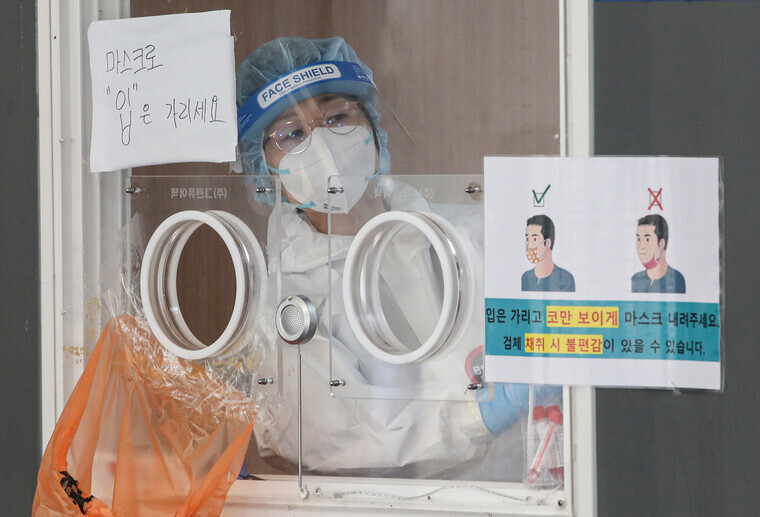hankyoreh
Links to other country sites 다른 나라 사이트 링크
S. Korea reports first blood clot case linked to AZ vaccine

South Korea’s first known case of unusual thrombocytopenic blood clotting following administration of the AstraZeneca (AZ) COVID-19 vaccine has been confirmed.
The clotting is a highly rare side effect observed after administration of the AZ vaccine.
In a regular Central Disease Control Headquarters (CDCH) briefing Sunday, the COVID-19 preventive vaccination response team said, “The first [South Korean] confirmed case of thrombocytopenic clotting has been observed.”
“The individual in question was a male in his early 30s who works at a facility considered vulnerable to infection risks. After receiving the AZ vaccine on April 27, he visited a medical institution and was treated on May 9 for severe headache symptoms,” the team explained.
“The symptoms continued, and three days later, on May 12, he experienced convulsions and was hospitalized. The presiding physicians diagnosed him with cerebral venous thrombosis, cerebral hemorrhage and epilepsy.”
Park Young-joon, director of the CDCH epidemiological investigation team, said the patient was “still hospitalized and undergoing treatment.”
“His condition has improved, and while his progress will need to be observed, his symptoms do not appear to have particularly deteriorated,” he added.
The healthcare institution in question reported the case as an adverse reaction on Thursday. An advisory group on blood clotting disorders held a meeting three days later on Sunday, in which it determined that the case clinically met the criteria for thrombocytopenic thrombosis. The side effects’ occurrence was confirmed on Monday based on subsequent testing.
“The clotting occurred in a cerebral venous sinus, which is an unusual location, and the case met the clinic criterion with the number of platelets dropping to below 150,000 per microliter,” said Jung Eun-kyeong, who heads the vaccination response team.
“We plan to ensure swift compensation based on harm compensation procedures,” she added.
A reduction in platelets, together with the occurrence of thrombi in unusual locations such as cerebral venous sinuses or splanchnic veins, is viewed as a rare side effect that may occur after administration of the AZ and Janssen COVID-19 vaccines.
The European Medicines Agency estimates that the occurrence of thrombi together with a reduction in platefuls occurs in roughly one in 100,000 people who have received the AZ vaccine.
In South Korea, a total of 3.27 million people have received their first dose of the AZ vaccine to date. The patient in question is the first for whom this side effect has been reported so far.
In March, cerebral venous clotting was confirmed in a male in his 20s who had received the AZ vaccine, but symptoms of thrombocytopenia were not observed.
Jung said, “Thrombocytopenic thrombosis is a condition that can be recovered from when it is detected early and treated appropriately.”
“Anyone who experiences potential thrombosis symptoms such as sustained severe headaches and severe abdominal pain four to 28 days after receiving their vaccine should immediately visit a healthcare institution for treatment,” she said.
The vaccination team also announced that it began pilot operation on Wednesday for a specialized counseling team consisting of nurses and other healthcare professionals within the Korea Disease Control and Prevention Agency call center at 1339 for specialized counseling on adverse reactions to vaccines.
The team will be available around the clock to provide counseling services on adverse reaction reporting, causality assessments, and compensation review procedures to patients experiencing adverse reactions and their family members.
By Seo Hye-mi, staff reporter
Please direct comments or questions to [english@hani.co.kr]

Editorial・opinion
![[Column] The state is back — but is it in business? [Column] The state is back — but is it in business?](https://flexible.img.hani.co.kr/flexible/normal/500/300/imgdb/original/2024/0506/8217149564092725.jpg) [Column] The state is back — but is it in business?
[Column] The state is back — but is it in business?![[Column] Life on our Trisolaris [Column] Life on our Trisolaris](https://flexible.img.hani.co.kr/flexible/normal/500/300/imgdb/original/2024/0505/4817148682278544.jpg) [Column] Life on our Trisolaris
[Column] Life on our Trisolaris- [Editorial] Penalties for airing allegations against Korea’s first lady endanger free press
- [Editorial] Yoon must halt procurement of SM-3 interceptor missiles
- [Guest essay] Maybe Korea’s rapid population decline is an opportunity, not a crisis
- [Column] Can Yoon steer diplomacy with Russia, China back on track?
- [Column] Season 2 of special prosecutor probe may be coming to Korea soon
- [Column] Park Geun-hye déjà vu in Yoon Suk-yeol
- [Editorial] New weight of N. Korea’s nuclear threats makes dialogue all the more urgent
- [Guest essay] The real reason Korea’s new right wants to dub Rhee a founding father
Most viewed articles
- 1Amid US-China clash, Korea must remember its failures in the 19th century, advises scholar
- 2[Column] The state is back — but is it in business?
- 360% of young Koreans see no need to have kids after marriage
- 4New sex-ed guidelines forbid teaching about homosexuality
- 5[Column] Life on our Trisolaris
- 6Presidential office warns of veto in response to opposition passing special counsel probe act
- 7Trump’s talk of flouting NATO promises sparks apprehension in Seoul
- 8[Reporter’s notebook] In Min’s world, she’s the artist — and NewJeans is her art
- 9[Guest essay] Maybe Korea’s rapid population decline is an opportunity, not a crisis
- 10Trump asks why US would defend Korea, hints at hiking Seoul’s defense cost burden